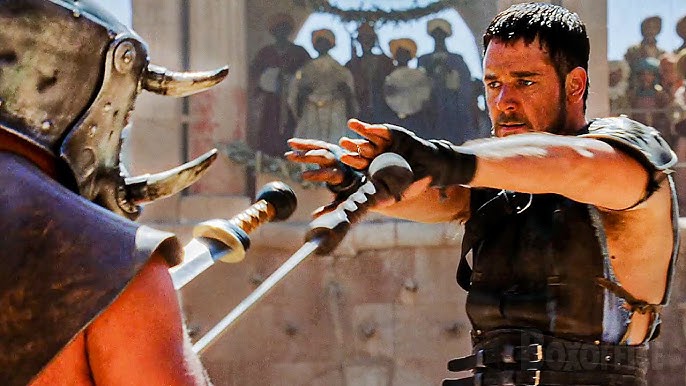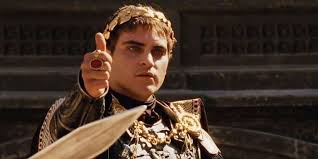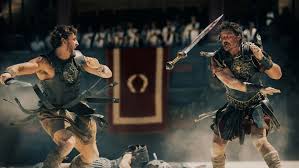Gladiator (2000)

Gladiator (2000) Review: A Timeless Epic of Honor and Revenge
Introduction Ridley Scott’s Gladiator (2000) is an epic historical drama that has left an indelible mark on cinema history. Starring Russell Crowe as Maximus Decimus Meridius, a betrayed Roman general seeking vengeance, the film is a powerful tale of loyalty, betrayal, and redemption. With stunning cinematography, a gripping narrative, and an unforgettable score by Hans Zimmer, Gladiator is widely regarded as one of the greatest films of all time. This review will explore the film’s key elements, including its story, performances, direction, themes, and legacy, while incorporating SEO-friendly keywords such as “Gladiator 2000 review,” “Russell Crowe performance,” and “Ridley Scott historical epic.”
Plot Summary Set in 180 AD, Gladiator follows the story of Maximus Decimus Meridius, a loyal and skilled general in the Roman army, who leads his troops to victory against the Germanic tribes under Emperor Marcus Aurelius (Richard Harris). Recognizing Maximus’ strength and integrity, the aging emperor wishes for him to become his successor instead of his own corrupt son, Commodus (Joaquin Phoenix). However, upon learning this, Commodus murders his father and seizes the throne, ordering the execution of Maximus and his family.
Barely escaping death, Maximus is captured and sold into slavery. He eventually becomes a gladiator, fighting in the brutal arenas of the Roman Empire. With his unparalleled combat skills and undying spirit, Maximus rises through the ranks, earning the admiration of the people and catching the attention of Commodus. As he plots his revenge, Maximus must navigate the treacherous politics of Rome, battle formidable opponents, and ultimately confront the man responsible for his suffering.
Russell Crowe’s Iconic Performance Russell Crowe’s portrayal of Maximus Decimus Meridius is one of the most celebrated performances in cinematic history. His commanding presence, physical intensity, and emotional depth make Maximus a compelling protagonist. From the sorrow of losing his family to the determination of seeking justice, Crowe embodies the character’s pain and resilience. His iconic lines, such as “Are you not entertained?” and “What we do in life echoes in eternity,” have become legendary. Crowe’s performance earned him the Academy Award for Best Actor, cementing his status as one of Hollywood’s finest.
Joaquin Phoenix as Commodus: A Villain for the Ages Joaquin Phoenix delivers a masterful performance as Commodus, the film’s antagonist. His portrayal of the insecure, power-hungry, and deeply flawed emperor adds layers of complexity to the character. Commodus’ desperate need for approval, particularly from his late father and the Roman citizens, drives his cruel and erratic behavior. Phoenix’s ability to balance vulnerability with ruthless ambition makes Commodus one of cinema’s most memorable villains. His intense confrontations with Maximus, filled with psychological and emotional tension, elevate the film’s drama.
Ridley Scott’s Direction and Cinematic Brilliance Ridley Scott’s direction in Gladiator is nothing short of extraordinary. His meticulous attention to detail, from the authenticity of the Roman architecture to the brutal realism of the gladiatorial combat, immerses viewers in the ancient world. Scott’s use of sweeping cinematography, slow-motion battle sequences, and dramatic lighting enhances the film’s epic scale. The decision to use practical effects, combined with CGI for large-scale shots of the Colosseum, results in a visually stunning experience that still holds up over two decades later.
Hans Zimmer’s Unforgettable Score No discussion of Gladiator is complete without mentioning Hans Zimmer’s breathtaking score. The film’s soundtrack, particularly the hauntingly beautiful track “Now We Are Free,” composed with Lisa Gerrard, adds emotional depth to the narrative. Zimmer’s orchestral arrangements, blending powerful percussion with ethereal vocals, elevate key moments, making them even more impactful. The music perfectly complements the film’s themes of loss, vengeance, and triumph, leaving a lasting impression on audiences.
Themes of Honor, Revenge, and Legacy At its core, Gladiator explores profound themes that resonate across cultures and generations.
- Honor and Duty: Maximus represents the ideal warrior—loyal, honorable, and dedicated to his cause. His refusal to bow to tyranny and his commitment to justice make him a symbol of integrity.
- Revenge and Justice: The film is fundamentally a revenge story, but it also delves into the cost of vengeance. Maximus’ journey is not just about personal retribution but also about restoring Rome to its former glory.
- Legacy and Immortality: The film repeatedly references the idea that our actions echo in eternity. Maximus’ legacy extends beyond his victories in the arena, influencing the fate of the empire and inspiring change.

Historical Accuracy vs. Artistic License While Gladiator is inspired by real historical events and figures, it takes several creative liberties for dramatic effect.
- Maximus Decimus Meridius: The character is fictional, though he is loosely based on historical figures such as Marcus Nonius Macrinus and Narcissus, the man who allegedly assassinated Commodus.
- Commodus: While Commodus was indeed a real emperor, his portrayal in the film is exaggerated. In reality, he was a megalomaniac who participated in gladiatorial combat, but he did not murder his father, Marcus Aurelius.
- The Gladiator Games: The depiction of gladiatorial fights is somewhat romanticized. While the brutality is authentic, the presence of an honorable warrior like Maximus is more cinematic than historical.
Despite these inaccuracies, Gladiator captures the spirit of ancient Rome, immersing audiences in its political intrigue, military conflicts, and the spectacle of the Colosseum.
Box Office Success and Awards Gladiator was a massive success both critically and commercially. The film grossed over $460 million worldwide and won multiple Academy Awards, including:
- Best Picture
- Best Actor (Russell Crowe)
- Best Costume Design
- Best Sound
- Best Visual Effects
The film’s success revitalized interest in historical epics, paving the way for similar films such as Troy (2004) and Kingdom of Heaven (2005).
Cultural Impact and Legacy Over two decades after its release, Gladiator remains a cultural phenomenon. The film’s quotes, characters, and music continue to be referenced in pop culture. Its influence can be seen in various forms of media, from video games to television series. Moreover, the film’s themes of resilience and justice resonate with audiences worldwide.
Upcoming Sequel: What to Expect? A sequel to Gladiator is currently in development, directed by Ridley Scott. While details remain limited, the film is expected to explore the story of Lucius, the son of Lucilla and nephew of Commodus. With Scott at the helm, expectations are high for another visually spectacular and emotionally gripping historical epic.
Final Verdict Gladiator (2000) is a masterpiece of storytelling, direction, and performance. Its gripping narrative, breathtaking visuals, and unforgettable score make it one of the greatest films ever made. Russell Crowe’s portrayal of Maximus is iconic, and Joaquin Phoenix’s Commodus remains one of cinema’s most compelling villains. Whether you’re a fan of historical epics or simply love a well-crafted revenge tale, Gladiator is a must-watch.










